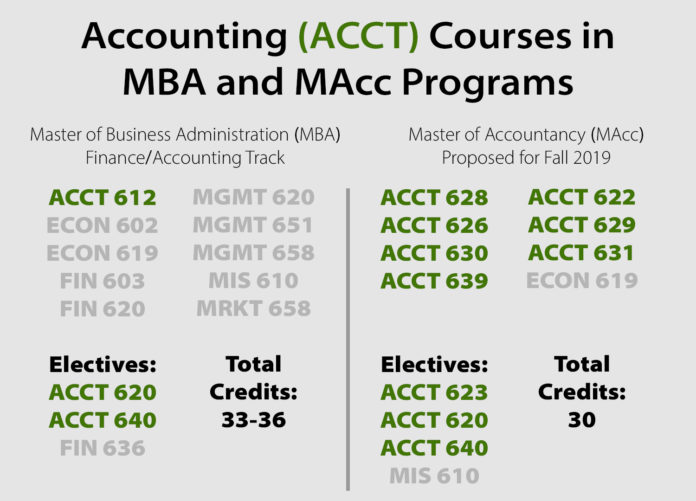At their quarterly formal meeting last Friday, Sept. 21, the Council of Trustees approved two master’s programs, including the Master of Accountancy, for fall 2019, pending the chancellor’s approval.
The Master of Accountancy will be a 30-credit program. Students would take four eight-week classes in the fall and spring and two classes in the summer to complete the program in less than a year. The courses will be offered in a blended format between online class sessions and meetings at the Regional Learning Alliance Center in Cranberry.
The program will include eight required courses, and students will choose two out of four electives. These electives include Non-Profit/Government Accounting, Forensic Accounting, Business Law and Business Analysis and Decision Support.
“Accounting is a pretty large topic area with a lot of different subjects that are included, like tax, audit, consolidations and consulting,” Melanie Anderson, a professor in the School of Business, said. “There’s a lot of things we can do with that.”
The School of Business will promote the Master of Accounting as a 4+1 degree program for current accounting majors. When students in this option graduate, they will have received 150 credits, the minimum to take the Certified Public Accountant (CPA) exam. As undergraduates, students will have the opportunity to take four courses for graduate credit.
In addition to the CPA certification, students who complete the Master of Accountancy will be able to earn other certifications, including Certified Internal Auditor (CIA), Certified Fraud Examiner (CFE) and Certified Management Accountant (CMA).
“Additional certifications will only enhance your career success for accountants,” Anderson, who has the CIA and Certified Information Systems Auditor certifications, said. “That’s very common for folks to have multiple certifications.”
Currently, SRU offers a Master of Business Administration (MBA) with an accounting/finance track. In that program, students take up to three accounting classes. In the proposed Master of Accountancy, students can take up to nine accounting classes.
“The MBA is more of a general master’s degree in business,” Anderson said. “Ours is a focused, professional degree on accounting areas and skillsets.”
According to Anderson, less than 20 percent of SRU’s MBA students are accounting majors.
“We feel like we’re not going to be taking students away from the MBA program because there are not that many accounting students in there,” Anderson said.
Two other Pennsylvania State System of Higher Education (PASSHE) universities—Bloomsburg and Clarion—offer a Master of Accountancy. The majority of classes, except for summer classes, for Bloomburg’s program meet on campus while Clarion’s program is online. Additionally, Anderson says that SRU’s proposed Master of Accountancy will be different from those programs due to the emphasis on certification exams.
“We’re trying to make sure we’re a slightly different focus than they are,” Anderson stated.
For the full report on the Master of Accountancy from the Council of Trustees meeting, click here.
The Council of Trustees also sent the Master of Social Work to the chancellor for approval with an anticipated implementation of fall 2019.








